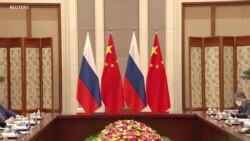With Africa "in play" between the polarities of China and Russia, both outside nations are using a variety of "tools" ranging from violence to development aid to try to sway the continent's nations in each's direction.
The battle for Africa dominance was examined in detail on April 21 at Washington D.C's Georgetown University, in a discussion titled "Russian and Chinese Actors in the African Security Landscape."
As noted in a Washington Post exclusive article published April 24, Moscow is increasingly using a proxy force, the mercenary Russia-based "Wagner Group" to both project power and, in cases, intimidate.
An analyst at King's College in London, Alessandro Arduino, said that despite public displays of friendship and solidarity between Moscow's Vladimir Putin and Beijing's Xi Jinping, it appears that Russia is getting rough at times to get its way.
"Recently in the Central African Republic (CAR) there was a horrific attack on a gold mine run by the Chinese," he told the panel. "Nine Chinese employees were killed and two wounded. Some time before, another group of Chinese specialists was abducted in the Central African Republic near the border with Cameroon. The perpetrators of these attacks and kidnappings have not yet been found...(but) local residents pointed to the possible involvement of mercenaries in these incidents.”
While Wagner never claimed responsibility for the killings, U.S. - Africa policy researcher Marcel Plichta says they bear the group's modus operandi
"The current killing of Chinese specialists is similar to a deliberate execution, which is very different, for example, from the actions of local militants: they [locals] usually kidnap people for ransom.”
Arduino points out the huge difference between China's policy of maintaining calm and Wagner's exploitation of the intimidating effects of violence.
“While the necessary condition for the China Belt and Road Initiative is stability in those countries with which Beijing works, the Wagner group is interested precisely in instability," he said.
Plichta notes that Wagner's presence and actions are not always aligned with Moscow's plans, as the Post has noted between Wagner boss Yevgeny Prigozhin and Russia's military leaders in the Ukraine conflict.
“Moscow, of course, does not want to allow Wagner to become the cause of its friction with Beijing, but in the case of Yevgeny Prigozhin’s subordinates, the question arises of how command and control functions can be exercised to prevent possible conflicts," he said. "
"In the regular army, there is a chain of commanders who are subordinate to the leadership of the country, but this does not work with mercenaries,” Plichta added
The analyst also noted that in Africa, Wagner's fist is not as knuckled as it is in Ukraine, saying "the actions of this group in Ukraine and in Africa are very different: in Russian aggression [in Ukraine], Wagner is an open assault force, it is not about the economy, while in Africa these mercenaries are engaged in shadow and hybrid activities related to security, economic resources and propaganda.”
Indeed, in Sudan and elsewhere, Wagner operates gold mines and other "revenue chains" either with the agreement and compliance of that nation's leaders or acting unilaterally.
In the face of violence at some of its African operations, China may feel compelled to provide armed security to protect its nationals who are working on the continent. And if they indeed "arm up," the King's College analyst said conditions for a clash grow.
“It is quite possible the beginning of a serious rivalry between representatives of China and Wagner, which at first does not look like hostility, but before that it may not be far," he said. "As a rule, these companies now do not have weapons, but they also contract with local armed units to provide security services.”
On the surface of diplomacy, Russia and China have shown cooperation exemplified by the late February 2023 joint naval exercises involving both of them and South Africa. Russia's public face in Africa has been one of engagement, as evidenced by Foreign Minister Sergei Lavrov's recent diplomatic tour.
The proxy Wagner force, meanwhile, advances Moscow's African agenda without leaving "official fingerprints."
US International University at Nairobi professor Elijah Munyi told the Georgetown panel that amid the competition for Africa between Beijing and Moscow, the United States is not effectively framing the situation to the continent.
"The United States uses the term 'great power competition' everywhere, but in Africa - and certainly in small African countries - this term is not welcomed and rejected."
This report, compiled by VOA Africa's Jeffrey Young, was derived from an article written by VOA Russian Service's Danial Galperovich as well as the Washington Post.




